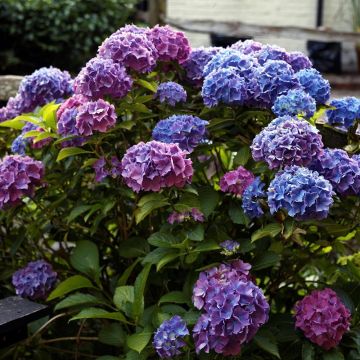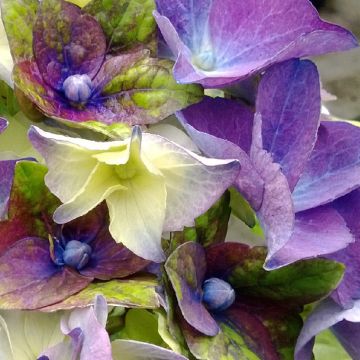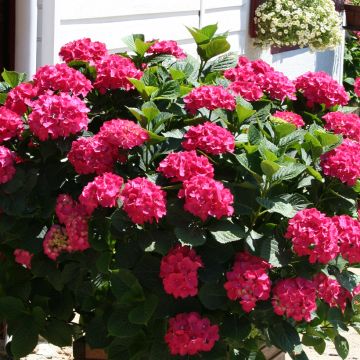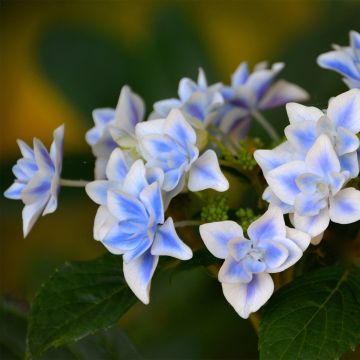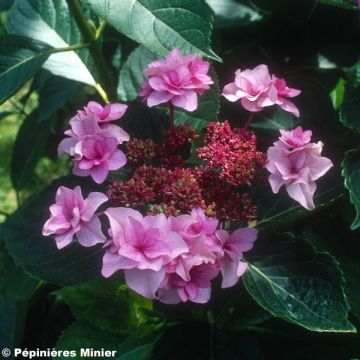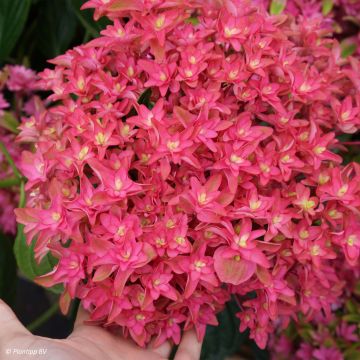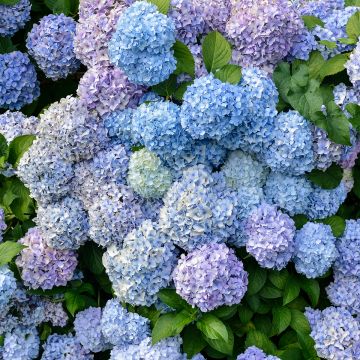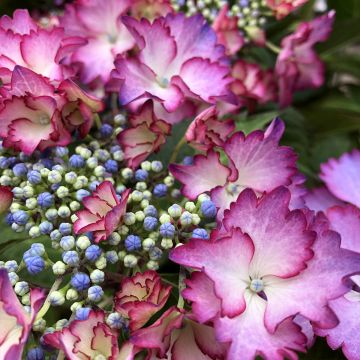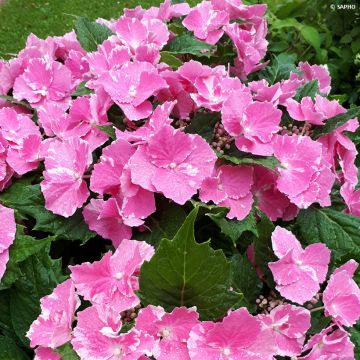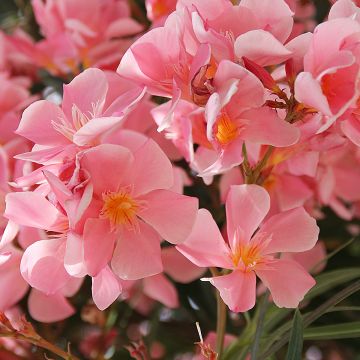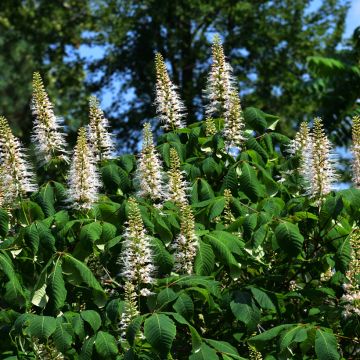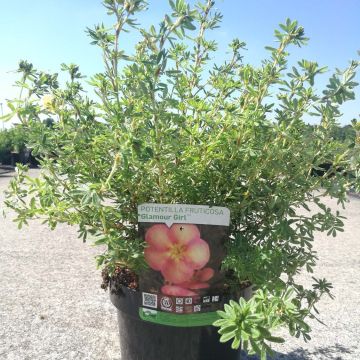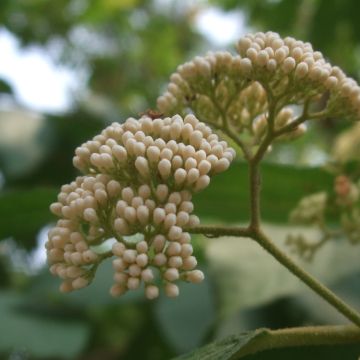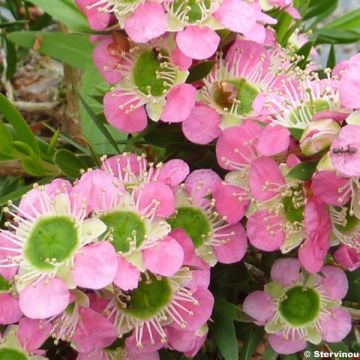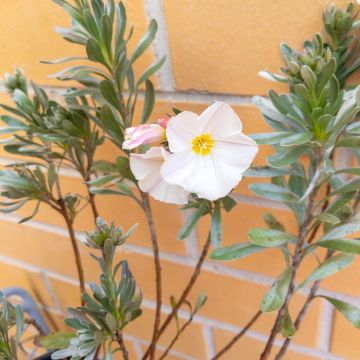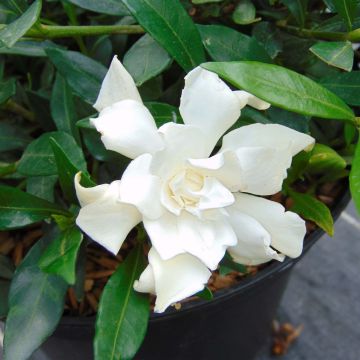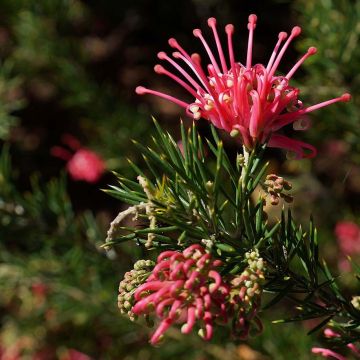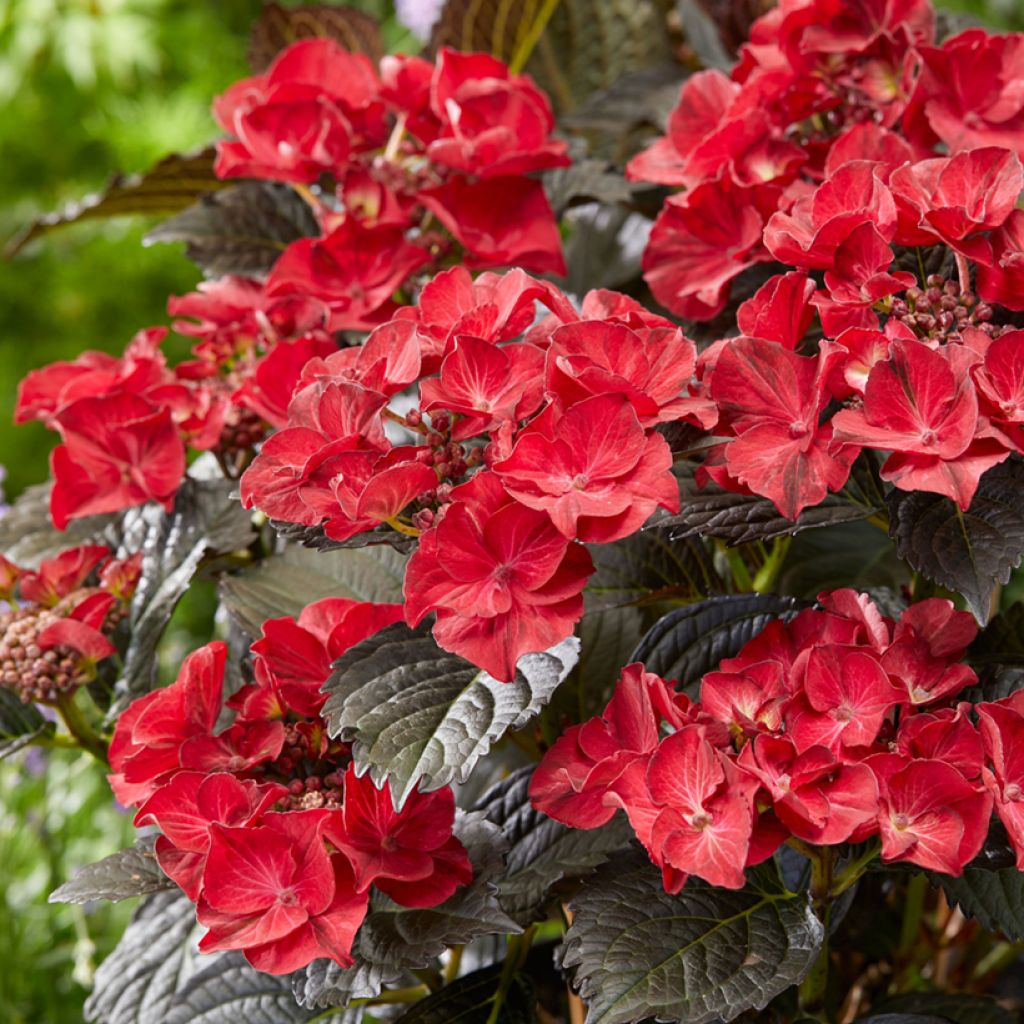

Hydrangea macrophylla x serrata After Midnight - Mophead Hydrangea
Hydrangea macrophylla x serrata After Midnight - Mophead Hydrangea
Hydrangea macrophylla x serrata After Midnight ('Jong 02')
Bigleaf Hydrangea, Mophead Hydrangea
Special offer!
Receive a €20 voucher for any order over €90 (excluding delivery costs, credit notes, and plastic-free options)!
1- Add your favorite plants to your cart.
2- Once you have reached €90, confirm your order (you can even choose the delivery date!).
3- As soon as your order is shipped, you will receive an email containing your voucher code, valid for 3 months (90 days).
Your voucher is unique and can only be used once, for any order with a minimum value of €20, excluding delivery costs.
Can be combined with other current offers, non-divisible and non-refundable.
Why not try an alternative variety in stock?
View all →This plant carries a 24 months recovery warranty
More information
We guarantee the quality of our plants for a full growing cycle, and will replace at our expense any plant that fails to recover under normal climatic and planting conditions.
Would this plant suit my garden?
Set up your Plantfit profile →
Description
The Hydrangea macrophylla x serrata After Midnight is an intense variety, with its black-purple foliage that retains its colour throughout the season, providing a remarkable backdrop for its ever-changing flowers in a rich and deep red. At the beginning of the flowering period in July, the flowers are flat, in a "lacecap" form, and then gradually round out into bulging domes. Similarly, they transition from pink to deep red. This recent variety has a fairly compact and nicely rounded habit, and a generous summer flowering. Plant it in the garden or in a large pot on the terrace, in non-scorching sun or partial shade, in a rich, moist, and lime-free soil. In very acidic soils, the flowers tend to be bluish-violet.
The Hydrangea After Midnight, known by its cultivar name 'Jong 02', was developed in the Netherlands by hydrangea specialists Peter Kolster from Kolster BV and Kees Eveleens from Horteve Breeding. This variety requires little maintenance and can withstand temperatures as low as -20°C. Like all hydrangeas, this deciduous shrub belongs to the Hydrangeaceae family.
This After Midnight hydrangea has a rounded and branched habit, as wide as it is tall, reaching approximately 1.20m in all directions. Its leaves have a remarkable colour throughout the growing season, ranging from purple to dark blackish-purple. They are arranged opposite on the branches, ovate with a pointed tip, and have toothed edges and prominent veins. This variety blooms from July onwards, earlier or later depending on the climate. Its inflorescences, initially flat and then hemispherical, are composed of numerous decorative sterile florets. Their colour varies from dark pink to rich red, depending on the maturity of the flowers. This flowering contrasts beautifully with the foliage. Hydrangeas can live for at least 50 years.
The After Midnight Hydrangea captivates with the richness and brilliance of its colours. It is the first hydrangea with rounded flowers to have such dark foliage that does not turn green in summer. The most similar variety is 'Merveille Sanguine', introduced in 1939, which has purplish-green foliage but without the black tones. It pairs particularly well with blue-flowered varieties like 'Teller Blue', as the colours complement each other. Hydrangeas are well-known for brightening the north side of houses. This variety thrives in a non-scorching east or west exposure, in borders as well as hedges. It is well-suited for container cultivation, where it can be placed on the terrace in a beautiful pot or near the entrance. Pair it with Fuchsia magellanica, annual Impatiens, and foxgloves. Alternatively, plant spring-flowering bulbs in front of their rounded silhouette. Enjoy their sumptuous flowering in the garden or indoors for a long time.
Report an error about the product description
Hydrangea macrophylla x serrata After Midnight - Mophead Hydrangea in pictures
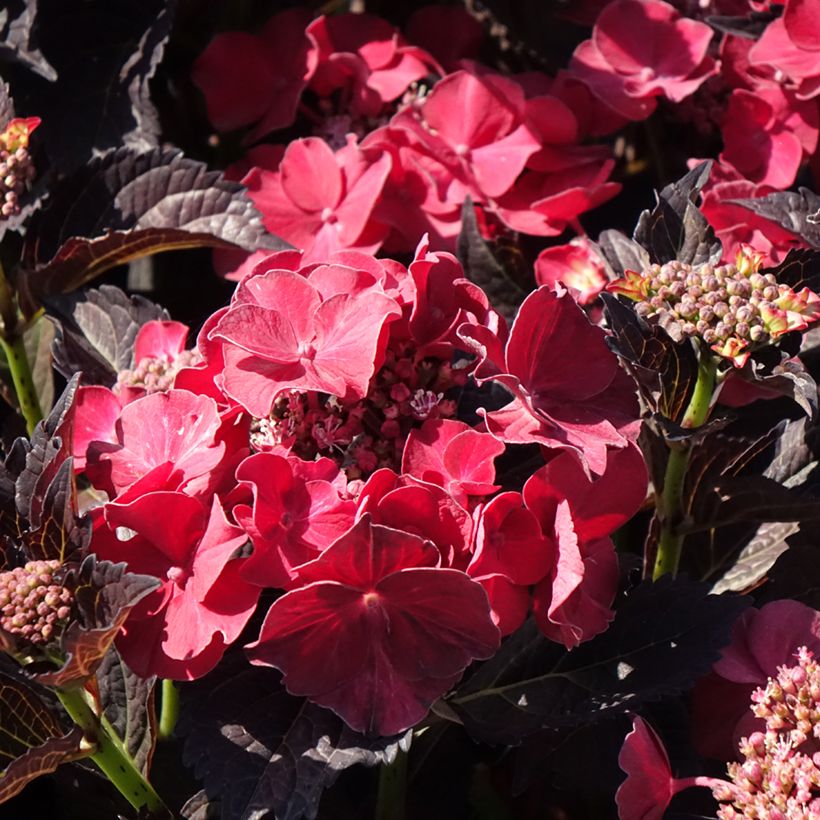

Plant habit
Flowering
Foliage
Botanical data
Hydrangea
macrophylla x serrata
After Midnight ('Jong 02')
Hydrangeaceae
Bigleaf Hydrangea, Mophead Hydrangea
Cultivar or hybrid
Planting and care
Plant the Hydrangea macrophylla After Midnight in spring or early autumn, preferably in a slightly shaded location, for example against an east-facing wall, or even north-facing. This bush does not like hot situations. Protect it from strong winds. It does not require pure ericaceous soil, but appreciates an acidic to slightly acidic, rich, deep, moist, and well-drained soil. You can enrich the soil with a good base fertiliser before planting. If the soil is dry at the base of the wall, place the root ball at least 30-40 cm away from the base of the wall and incorporate a quantity of well-rotted compost to better retain moisture in the soil. Very hardy, it can be planted in cold regions without fear. As for pruning, remove faded flowers on the first bud or on the pair of buds directly below. Cut back a quarter or a third of the older stems at the base when the plant is mature to promote the formation of new shoots. Carry out this pruning every year during the months of March and April.
Planting period
Intended location
Care
This item has not been reviewed yet - be the first to leave a review about it.
Similar products
Haven't found what you were looking for?
Hardiness is the lowest winter temperature a plant can endure without suffering serious damage or even dying. However, hardiness is affected by location (a sheltered area, such as a patio), protection (winter cover) and soil type (hardiness is improved by well-drained soil).

Photo Sharing Terms & Conditions
In order to encourage gardeners to interact and share their experiences, Promesse de fleurs offers various media enabling content to be uploaded onto its Site - in particular via the ‘Photo sharing’ module.
The User agrees to refrain from:
- Posting any content that is illegal, prejudicial, insulting, racist, inciteful to hatred, revisionist, contrary to public decency, that infringes on privacy or on the privacy rights of third parties, in particular the publicity rights of persons and goods, intellectual property rights, or the right to privacy.
- Submitting content on behalf of a third party;
- Impersonate the identity of a third party and/or publish any personal information about a third party;
In general, the User undertakes to refrain from any unethical behaviour.
All Content (in particular text, comments, files, images, photos, videos, creative works, etc.), which may be subject to property or intellectual property rights, image or other private rights, shall remain the property of the User, subject to the limited rights granted by the terms of the licence granted by Promesse de fleurs as stated below. Users are at liberty to publish or not to publish such Content on the Site, notably via the ‘Photo Sharing’ facility, and accept that this Content shall be made public and freely accessible, notably on the Internet.
Users further acknowledge, undertake to have ,and guarantee that they hold all necessary rights and permissions to publish such material on the Site, in particular with regard to the legislation in force pertaining to any privacy, property, intellectual property, image, or contractual rights, or rights of any other nature. By publishing such Content on the Site, Users acknowledge accepting full liability as publishers of the Content within the meaning of the law, and grant Promesse de fleurs, free of charge, an inclusive, worldwide licence for the said Content for the entire duration of its publication, including all reproduction, representation, up/downloading, displaying, performing, transmission, and storage rights.
Users also grant permission for their name to be linked to the Content and accept that this link may not always be made available.
By engaging in posting material, Users consent to their Content becoming automatically accessible on the Internet, in particular on other sites and/or blogs and/or web pages of the Promesse de fleurs site, including in particular social pages and the Promesse de fleurs catalogue.
Users may secure the removal of entrusted content free of charge by issuing a simple request via our contact form.
The flowering period indicated on our website applies to countries and regions located in USDA zone 8 (France, the United Kingdom, Ireland, the Netherlands, etc.)
It will vary according to where you live:
- In zones 9 to 10 (Italy, Spain, Greece, etc.), flowering will occur about 2 to 4 weeks earlier.
- In zones 6 to 7 (Germany, Poland, Slovenia, and lower mountainous regions), flowering will be delayed by 2 to 3 weeks.
- In zone 5 (Central Europe, Scandinavia), blooming will be delayed by 3 to 5 weeks.
In temperate climates, pruning of spring-flowering shrubs (forsythia, spireas, etc.) should be done just after flowering.
Pruning of summer-flowering shrubs (Indian Lilac, Perovskia, etc.) can be done in winter or spring.
In cold regions as well as with frost-sensitive plants, avoid pruning too early when severe frosts may still occur.
The planting period indicated on our website applies to countries and regions located in USDA zone 8 (France, United Kingdom, Ireland, Netherlands).
It will vary according to where you live:
- In Mediterranean zones (Marseille, Madrid, Milan, etc.), autumn and winter are the best planting periods.
- In continental zones (Strasbourg, Munich, Vienna, etc.), delay planting by 2 to 3 weeks in spring and bring it forward by 2 to 4 weeks in autumn.
- In mountainous regions (the Alps, Pyrenees, Carpathians, etc.), it is best to plant in late spring (May-June) or late summer (August-September).
The harvesting period indicated on our website applies to countries and regions in USDA zone 8 (France, England, Ireland, the Netherlands).
In colder areas (Scandinavia, Poland, Austria...) fruit and vegetable harvests are likely to be delayed by 3-4 weeks.
In warmer areas (Italy, Spain, Greece, etc.), harvesting will probably take place earlier, depending on weather conditions.
The sowing periods indicated on our website apply to countries and regions within USDA Zone 8 (France, UK, Ireland, Netherlands).
In colder areas (Scandinavia, Poland, Austria...), delay any outdoor sowing by 3-4 weeks, or sow under glass.
In warmer climes (Italy, Spain, Greece, etc.), bring outdoor sowing forward by a few weeks.






























